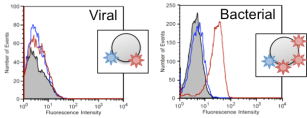Distributed Point of Care (POC) Molecular Diagnostics
 The future of point of care testing enables general practitioners and patients themselves to detect diseases. However, these distributed sample-in answer-out tests will require simple operation, interpretation, and connectivity to other healthcare resources. We are utilizing paper-based fluidic connections and cell-phone powered resistive heating to develop portable, instrument-free, molecular diagnostics that are as easy to use as a digital pregnancy test.
The future of point of care testing enables general practitioners and patients themselves to detect diseases. However, these distributed sample-in answer-out tests will require simple operation, interpretation, and connectivity to other healthcare resources. We are utilizing paper-based fluidic connections and cell-phone powered resistive heating to develop portable, instrument-free, molecular diagnostics that are as easy to use as a digital pregnancy test.
With mobile molecular diagnostics, users can be connected to centralized healthcare settings for immediate referral and counseling. This research will create rapid diagnostics and devices that enable disease prevention and improved care anywhere in the world.
Techniques and Skills
- Molecular biology
- Porous media (paper) filtration
- BioMEMS
- Thermal conductivity
- Smart phone connectivity
Pathogen Classification by Host Responses
The initial diagnosis required to treat acute infections such as sepsis and pneumonia is simply to differentiate between viral and bacterial pathogens. Yet current diagnostic methods can only rule out pathogens one-by-one. In contrast, we are developing detection mechanisms based on the hosts own response to these pathogens. This will allow for appropriate antibiotic/antiviral treatment to be provided to patients at the point of care.
Techniques and Skills
- Immunology
- Polymer chemistry
- Cytometry/Microscopy
- Microfluidics
Antibiotic Resistance Detection
 Antimicrobial resistance costs more than $55 billion per year. With the advent of resistant “superbugs”, such as carbapenem-resistant enterobacteriacaea (CRE) and cephalosporin-resistant gonorrhoeae, antibiotics against bacteria are becoming increasingly ineffective and require careful monitoring around the world. Rapid detection of resistance phenotypes will allow for efficient utilization of the most appropriate therapies and prevent the spread of further resistance.
Antimicrobial resistance costs more than $55 billion per year. With the advent of resistant “superbugs”, such as carbapenem-resistant enterobacteriacaea (CRE) and cephalosporin-resistant gonorrhoeae, antibiotics against bacteria are becoming increasingly ineffective and require careful monitoring around the world. Rapid detection of resistance phenotypes will allow for efficient utilization of the most appropriate therapies and prevent the spread of further resistance.
Techniques and Skills
- Microbiology
- Biochemistry
- BioMEMS and biosensor design

